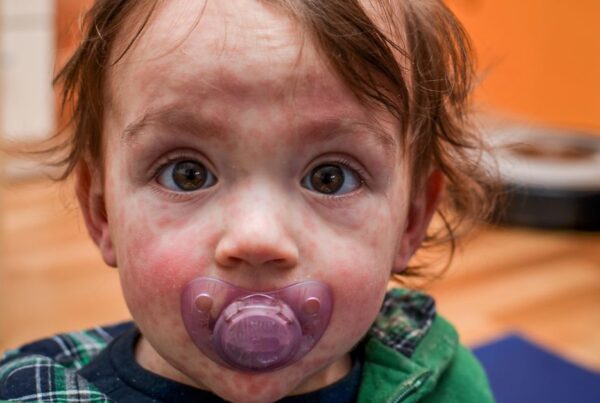Urinary tract infections (UTIs) are a common infection in kids. Parents who prefer a natural lifestyle often wonder: are antibiotics necessary for a urinary tract infection in kids? What natural treatments work for urinary tract infections? And when should parents call a doctor if their child has a urinary tract infection?
Note: In my practice I am quick to prescribe antibiotics for urinary tract infections in kids. UTIs can have lifelong consequences if not treated properly. Please consider these natural treatments to be supportive options to take alongside antibiotic treatment rather than instead of antibiotic treatment.
Symptoms Of Urinary Tract Infections
In babies and toddlers under 2, unexplained fever is the most common symptom of urinary tract infection.
In children over 2, signs and symptoms of a lower urinary tract infection include: lower pelvic pain and tenderness, painful urination, frequent urination, urgent urination, bedwetting after being dry for a period of time, daytime accidents, cloudy urine, and foul smelling urine. Children may have some or all of these symptoms. Lower urinary tract infections may progress to a more serious upper urinary tract infection.
In children over 2, signs and symptoms of an upper urinary tract infection include: fever, chills, kidney pain (lower back and sides), and pink or red urine. Immediate medical attention is needed if symptoms of an upper urinary tract infection are present. Though uncommon, untreated upper urinary tract infections can lead to permanent kidney scarring and lifelong kidney damage.
Sometimes urinary tract infections don’t cause any signs or symptoms. This is called a silent urinary tract infection.
Causes Of Urinary Tract Infections
Urinary tract infections are caused by bacteria (or occasionally yeast/fungus) which make their way into the urethra. Infections can spread from the urethra to the bladder to the ureters to the kidneys. The seriousness of the infection increases as it progresses from one structure to the next.
Bacterial yeast infections in kids often start because of improper wiping, diapers, constipation, and touching. Lowered immune function, diets high in sugar, blood sugar control problems, dysbiosis, recent antibiotic use, and food allergies may contribute to the development of UTIs and should be considered in the case of recurrent infections.
The Best Natural Supportive Treatments For Urinary Tract Infections
It bears repeating that in most cases antibiotics are the appropriate primary treatment for urinary tract infections for children. The natural treatments described below should be considered supportive treatments.
- Drink Plenty Of Fluid & Urinate Often. Flushing the urinary tract with lots of fluid helps literally clean bacteria out of the urinary tract. Choose water, breast milk, formula and soothing herbal teas (see below) over juices, hydration formulas, and cows milk.
- Keep Genitals Clean And Dry. Ensuring that proper wiping technique (wiping front to back) is in place is important for kids. Going diaper-free if possible can help, even if it is just for a couple hours at a time. Wearing cotton underwear and loose clothes can help.
- Probiotics. Probiotics are indicated anytime there is evidence of dysbiosis- this includes infections like urinary tract infections. Studies have shown that probiotics are useful for preventing recurrent UTIs in children.
- D-Mannose. D-Mannose is a simple sugar that works to help prevent the adherence of bacteria to the walls of the bladder and can help urinary tract infections resolve more swiftly. Safety hasn’t been studied in children, but because it is a naturally occurring sugar that is present in many fruits and in the human body, the risk is low. Side effects can include loose stools and bloating.
- Vitamin D. There is a significant relationship between vitamin D deficiency and urinary tract infection in children. I often recommend vitamin D for kids with a urinary tract infection not to treat the infection, but to address the underlying deficiency.
- Soothing Herbs. Soothing herbal teas or glycerites made from marshmallow root, corn silk, or couch grass can help with the discomfort caused by a UTI.
- Diuretic and Antimicrobial Herbs. Herbs like parsley, dandelion leaf, uva ursi, horsetail, and nettles help flush the urinary tract, kill microbes, and speed healing. These herbs are given separately from soothing herbs because the phytochemicals in these plants may cause a strange texture in the tea if taken together.
Popular Natural Treatments For UTIs That I Do NOT Usually Recommend For Kids
- Cranberry Juice. 2-4 ounces of unsweetened cranberry juice may be helpful for treating urinary tract infections. It works by making E. coli bacteria less likely to stick to the walls of the bladder so that they can be washed away by urination. I don’t often recommend it for kids for several reasons, chief among them being the taste. In addition, cranberry juice seems to be best used as a preventative rather than as a treatment, and cranberry juice is a potential bladder irritant. All that being said, if kids like the taste of unsweetened cranberry juice and it doesn’t irritate their bladder, it can certainly be added to a treatment protocol.
- Zinc. Zinc is an immune system superstar and something I often recommend as part of a treatment plan for many different infections. However, I don’t recommend zinc for urinary tract infections because the bacteria which most often cause UTIs have a method for evading zinc-mediated immune strategies.
When To See A Doctor
Urinary tract infections can progress quickly, especially in small children and babies. Therefore, it is important to initiate treatment promptly and to take prescribed antibiotics when advised.
Summary
Urinary tract infections may occur in children of any age. Natural treatment is great for urinary tract infections in adults and teens, but in kids and babies I most often recommend antibiotics because of the potential for the infection to progress rapidly, cause severe disease, and even lifelong kidney damage. That being said, natural treatments can reduce discomfort and speed healing when taken alongside antibiotics for urinary tract infections.
References:
Leung, A., Wong, A., Leung, A., & Hon, K. L. (2019). Urinary Tract Infection in Children. Recent patents on inflammation & allergy drug discovery, 13(1), 2–18. https://doi.org/10.2174/1872213X13666181228154940
Stocks, C. J., Phan, M. D., Achard, M., Nhu, N., Condon, N. D., Gawthorne, J. A., Lo, A. W., Peters, K. M., McEwan, A. G., Kapetanovic, R., Schembri, M. A., & Sweet, M. J. (2019). Uropathogenic Escherichia coli employs both evasion and resistance to subvert innate immune-mediated zinc toxicity for dissemination. Proceedings of the National Academy of Sciences of the United States of America, 116(13), 6341–6350. https://doi.org/10.1073/pnas.1820870116
González de Llano, D., Moreno-Arribas, M. V., & Bartolomé, B. (2020). Cranberry Polyphenols and Prevention against Urinary Tract Infections: Relevant Considerations. Molecules (Basel, Switzerland), 25(15), 3523. https://doi.org/10.3390/molecules25153523
Lenger, S. M., Bradley, M. S., Thomas, D. A., Bertolet, M. H., Lowder, J. L., & Sutcliffe, S. (2020). D-mannose vs other agents for recurrent urinary tract infection prevention in adult women: a systematic review and meta-analysis. American journal of obstetrics and gynecology, 223(2), 265.e1–265.e13. https://doi.org/10.1016/j.ajog.2020.05.048
Domenici, L., Monti, M., Bracchi, C., Giorgini, M., Colagiovanni, V., Muzii, L., & Benedetti Panici, P. (2016). D-mannose: a promising support for acute urinary tract infections in women. A pilot study. European review for medical and pharmacological sciences, 20(13), 2920–2925.
Sadeghi-Bojd, S., Naghshizadian, R., Mazaheri, M., Ghane Sharbaf, F., & Assadi, F. (2020). Efficacy of Probiotic Prophylaxis After The First Febrile Urinary Tract Infection in Children With Normal Urinary Tracts. Journal of the Pediatric Infectious Diseases Society, 9(3), 305–310. https://doi.org/10.1093/jpids/piz025
Shim, Y. H., Lee, S. J., & Lee, J. W. (2016). Antimicrobial activity of lactobacillus strains against uropathogens. Pediatrics international : official journal of the Japan Pediatric Society, 58(10), 1009–1013. https://doi.org/10.1111/ped.12949
Deng, Q. F., Chu, H., Wen, Z., & Cao, Y. S. (2019). Vitamin D and Urinary Tract Infection: A Systematic Review and Meta-Analysis. Annals of clinical and laboratory science, 49(1), 134–142.


